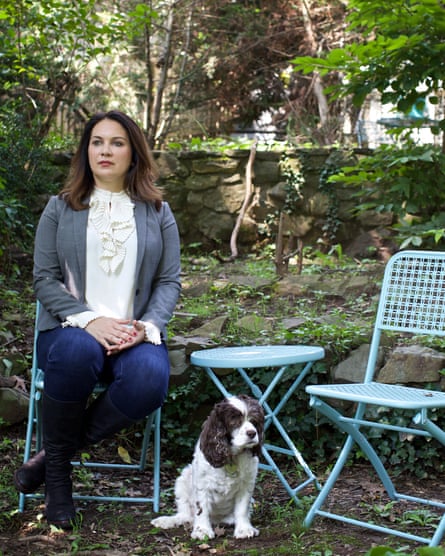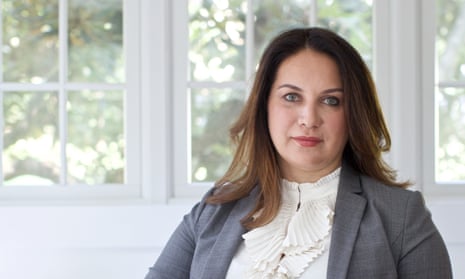Of all the compelling things about Caliphate, the hit New York Times podcast – the suspense, the pacing, the blockbuster access to a former member of Islamic State – the most compelling is the relationship between reporter Rukmini Callimachi and the young man calling himself Abu Huzaifa. He is the Canadian former jihadi whose accounts of his time in Syria, including details of how Isis members practice their stabbing and beheading skills on gelatin-filled dolls, form the spine of the story and towards whom, at the end of the podcast, it is possible to feel something like empathy. As it turns out, this is a misguided impulse; at the last minute, everything changes and we are left, as Callimachi says, with the understanding that “deradicalisation is not some sort of neat process. And it’s not necessarily a linear progression.”
Callimachi, 45, has been a reporter for almost 20 years and is slightly surprised to be enjoying this moment of celebrity: the 10-episode podcast was released in April and promptly went to the top of the iTunes chart. Since then, its creator has been in much demand on talkshows. On the afternoon we meet, in a conference room at the New York Times, she is in the middle of reporting a story, about four western cyclists killed in Tajikistan by men identifying themselves as members of Isis, and planning her next trip to Syria. She is also still bound up in the story of Huzaifa, who was apprehended by the Canadian authorities the day after Callimachi first interviewed him, and towards whom she has ambivalent feelings. “That’s the peculiarity of the beat I’m on,” she says. “I cover a bunch of killers, who vary in the level of disgust or empathy that they evoke in me. Initially [Huzaifa] evoked empathy in us, because he seemed to be coming clean.”
The success of Caliphate is largely down to Huzaifa’s revelations of life inside Isis, or rather in the juxtaposition of those revelations, which include details of how he killed two people and savagely beat a third, with the impression that he is otherwise an extremely ordinary and goofy Canadian kid. Caliphate also succeeds as a piece of theatre. Taking its cue from Serial, the hit podcast in which This American Life reporter Sarah Koenig dug up a cold case and established a kind of behind-the-curtain style of presentation, Callimachi’s podcast reports not only facts, but her response to them. It is occasionally darkly hilarious; in one episode, Callimachi reveals that she has become a target of teenage satire in the Isis chatrooms she accesses via an encrypted app she was invited on to by her ex-jihadi sources. Apparently, young recruits have been making fun of her weight. “Fat-shamed by Isis,” she says drily. At another point, after being told by the FBI that a credible threat has been made against her, she calls 911 in a panic when someone bangs on her door late at night. The dispatcher’s baffled response – “I’m sorry, ma’am, you’re saying Isis is banging on your door?” – is one for the ages.

In both cases, Callimachi had to be persuaded by her producer, Andy Mills, to include the audio clip; she is a foreign correspondent by trade and inserting herself into the story went against every grain of her training. Did she think the fat-shaming joke was trivialising? “No, I was worried that – ” Callimachi bursts out laughing – “everyone would think I’m really fat. I’m sorry to be vain but ... it really took my team to convince me to let these flashes of my personal life come in. I finally came on board when I realised you have to have a vehicle for telling. There has to be some sort of person on the other end of that.”
The result is a combination of intricate reporting and personalised responses that tend to shy away from firm conclusions. The motivations of young men running off to join Isis are hard to quantify, she says. In the case of Huzaifa, whom she tracked down via social media and who, to her amazement, agreed almost immediately to an interview, “the basic gist of it is that he just did not find his place in the world”. The son of Pakistani immigrants to Canada, Huzaifa’s life might have been different if he had gone to college or had a vocation or something that made him excited to be in Canada, she says. “On top of it, he’s an awkward kid, he doesn’t have a lot of friends, he’s not very good at school. At the same time, he finds his way into these chatrooms, and this is the thing that is hard to parse about these people: at some level, his motivation was compassion. His heart was bleeding when he saw those images of Syrian kids being killed, like all of us. He wants to do something and he’s a teenager, and he’s talking to these people who say: ‘Yes! You can! Here’s what you can do; you can be a warrior, you can save them.’ Giving him agency and a sense of purpose where he had none.”
The question of contrition comes up again and again. In the middle of the series, just as listeners are starting chummily to identify with Huzaifa, an interview is inserted with Yazidi girls who have escaped after being captured and traded as sex slaves by Isis fighters. (“Multiple times [Huzaifa] told us he thinks that’s really gross,” says Callimachi, but of course, neither was it a deal-breaker for him.) One is reminded that the peculiar revulsion inspired by Isis is a function of its brazenness, particularly concerning rape.
“What’s unique about how Isis approaches rape is that they have taken such pains to justify it within Islamic law – they point to verses in the Hadiths that speak about slavery. If you’re in Africa, you end up covering rape in the Congo, or Guinea, or Ivory Coast, and I tussled with this for a long time: I think it’s worse with Isis. In the Congo, when you go and interview [Rwandan rebel group] the FDLR, they completely deny that they rape. Isis doesn’t deny it. They embrace it. They not only say: ‘Yes we did it,’ they say: ‘Here’s why.’ There’s something almost diabolical about it.”
Huzaifa seemed different. “He’s OK with us thinking he’s a murderer, but not a rapist.” He seemed somewhat contrite. The reason he agreed to the interview, Callimachi believes, is that these things he claimed to have done – stabbing a man in the heart; shooting another in the head, both of which he says made him vomit copiously afterwards and eventually run back to Canada – “were weighing very heavily on him”. She understands now that she caught him in a brief window between escape from Isis and his apprehension by Canadian authorities, when he was perhaps more inclined to admit guilt.
“We tend to see that as a noble act,” she says. “It’s the Nazi who pretends the Holocaust never happened versus the Nazi who’s willing to sit down in front of you and reckon with what he really did. There’s something that is perhaps salvageable here. And that’s where we thought we started. And then we ended up somewhere very different.”

A question for all reporters, when they look back on their interviews, is the possibility of whether they have been played. When Callimachi sits down with a wily ex-jihadist, she brings an awful lot of experience to the room. It is not just her reporting background. She was born in Romania and, at the age of five, left with her family for Switzerland, where they lived for five years before being awarded asylum in the US. She understands being the oddball outsider at high school. She also understands, more intuitively than most, the process of political brainwashing. “Perhaps because I was born in a communist country where I saw my parents struggling against this totalitarian regime that made no sense – and saw the various justifications for that craziness – that has always been curious to me.”
After doing an MPhil in linguistics at Oxford, Callimachi flirted with the idea of staying on for a PhD in Sanskrit, “which I was terrible at, by the way; really, really bad at.” She wanted to write, and travel, and use languages, and it took her a while to figure out that journalism was the answer. She dropped out of the Sanskrit program, went to India and, after scrambling to get the last seat on a plane to Gujarat after the 2001 earthquake, won a byline in Time magazine and proceeded from there.
It irritates her, these days, to see unseasoned freelancers hop on a flight to Syria and complain that the big news organisations won’t take their copy. She spent a year on a local paper in Illinois before serving two years on the overnight shift for the Associated Press in Oregon. “Gruelling, back-breaking work.” She was sent to New Orleans after Hurricane Katrina – “not in the first wave, or the second wave – all of the stars went; then the B-stars. Then the C-stars. Then they were like: ‘Who wants to go?’ That was me” – and spent a year in the city, after which she won a job as the most junior reporter in the west Africa bureau.
Finally, in December 2008, when everyone else had gone home for Christmas, there was a coup in Guinea. Callimachi got her break. “Long, but so necessary,” she says of her trajectory. “Now I’m contacted all the time by young journalists who want to jump right into it, and freelancers who complain they don’t get paid anything when they’re overseas, and in the back of my head I’m thinking: ‘You’re trying to cut the queue.’”
The risk to journalists covering wars has changed; Isis actively targets foreign reporters and Callimachi will not go to Mosul without a security adviser. She thinks reports of the demise of Isis are exaggerated and dangerous. “Every politician wants to be the one to prove he has made real headway against this group. Granted, 97% of the territory it held is now gone. But 3% is still around 1,000 square miles. That’s not a small amount of land. And its caliphate was never just Iraq and Syria. It was this global project. It is growing in Niger, it’s growing in Nigeria, it’s growing in Afghanistan, in Libya. It’s like seeds that have gone to the wind.”
And Huzaifa? At the end of the podcast, under pressure from Canadian authorities who still can’t gather sufficient evidence to prosecute him, he makes an abrupt about-turn. “I think he started to get really cocky. And to go: ‘Oh, they can’t have me. They’ve got nothing on me, I’m totally free.’ And he decided to dig back deeper into the ideology that got him there in the first place.” It’s an instructive, if sobering conclusion. “I actually think he’s more radicalised now than when we started.”
